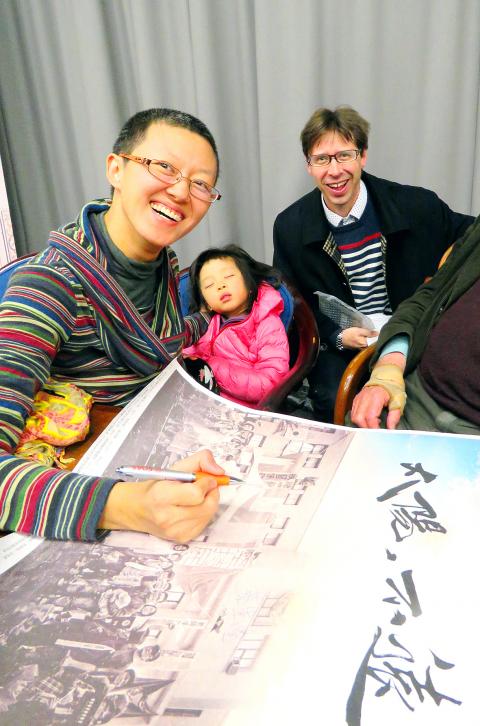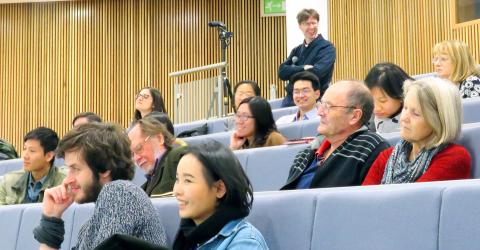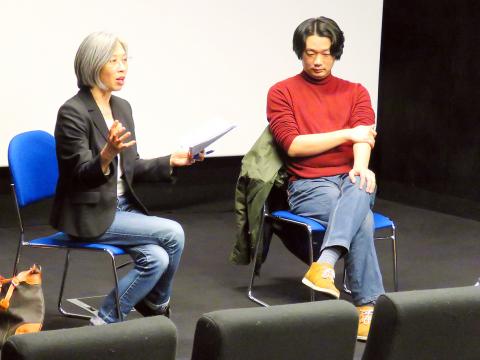For the vast majority of people in Europe, knowledge of the Taiwanese film scene extends no further than the work of director Ang Lee (李安) but a greater appreciation is being sparked by events such as the annual Taiwan Film Week at the Center of Taiwan Studies, part of the University of London’s School of Oriental and African Studies (SOAS).
Director of the Center of Taiwan Studies, Dafydd Fell, has found the medium of film a useful tool to address themes such as politics, modern history, society and economics.
“I teach in a political science department but being in the Taiwan studies community, I get exposed to a range of disciplines, including film. So I often use Taiwanese films in my teaching of Taiwanese politics.”

Photo: Jewel Lo
Fell, who presented the paper Portrayals of Democratic Politics in Taiwanese Film at last month’s European Association of Taiwan Studies Conference in Prague, responded to student interest in Taiwan’s social movements by screening the documentaries Civil Disobedience (公民不服從) and Sunflower Occupation at this year’s Taiwan Film Week in February. After the screenings, which respectively focus on the unrest generated by the visit to Taiwan of Association for Relations Across the Taiwan Strait Chairman Chen Yunlin (陳雲林) in 2008 and the events surrounding the occupation of the Legislative Yuan in 2014, the audience had the chance to take part in a question and answer session with director Chen Yu-ching (陳育青).
“The audiences tend to be quite diverse for the film screening events,” Fell says. “One group will be SOAS students taking our Taiwan courses but others will be non-students who are interested in Asian film, postgraduate students who have a film or Taiwan interest, [students at] other universities, members of the overseas Taiwanese community.”
“When we show social movement-related films then it is quite common for students who were activists in the past, but happen to be studying or working in the UK, to join screenings and they can bring something different to the discussion,” Fell says. “Social movement topics also tend to attract audience members from Hong Kong but also from China.”

Photo: Tony Phillips
Sunflower Occupation is an omnibus featuring different films outlining the progress and aftermath of the Sunflower movement, arguably the most important protest movement in a generation. Some of these look at the movement in its historical and social context, for example, by featuring former leaders of the Wild Lily Movement of 1990 talking about more recent events.
“It is definitely easier to record footage of social movements today,” Fell says. “In fact, in Sunflower Occupation some parts were filmed using phone cameras, such as the Executive Yuan occupation. However, recently a number of documentaries are being released about earlier social movements from the 1980s and 90s. I sense there is a lot of interest in the continuity between these earlier and more recent protest movements.”
“Recently there had been a stereotype that young people in Taiwan were just not interested in politics, thus the ‘Strawberry Generation’ label,” Fell says. “Election rallies tended to be dominated by older audiences. Recent protest movements and election campaigns have undermined that stereotype.”

Photo: Tony Phillips
Also featured in this year’s Taiwan Film Week was the The Losers (廢物), a film about three interconnected characters in Meinong (美濃), a Hakka district in Kaohsiung City, where land is being bought up by developers and estate agents.
The film highlights social issues such as land development, migrant spouse families, challenges to agriculture and drug problems, as well as Hakka culture.
Director Lou Yi-an (樓一安) also traveled to London for the screening and Q&A session.
“The audience response and feedback has been very good over the last few years,” Fell says. “The visiting film directors also enjoy coming to SOAS as the post-screening Q&A and discussion tend to be very informed and lively.”
Londoners will not have to wait until the next Taiwan Film Week for their Taiwanese film fix as the documentaries Gongliao How are you? (貢寮,你好?) and Small Oyster Rock in Kezailiao are scheduled for screenings at SOAS this summer.

For many centuries from the medieval to the early modern era, the island port of Hirado on the northwestern tip of Kyushu in Japan was the epicenter of piracy in East Asia. From bases in Hirado the notorious wokou (倭寇) terrorized Korea and China. They raided coastal towns, carrying off people into slavery and looting everything from grain to porcelain to bells in Buddhist temples. Kyushu itself operated a thriving trade with China in sulfur, a necessary ingredient of the gunpowder that powered militaries from Europe to Japan. Over time Hirado developed into a full service stop for pirates. Booty could

Politically charged thriller One Battle After Another won six prizes, including best picture, at the British Academy Film Awards on Sunday, building momentum ahead of Hollywood’s Academy Awards next month. Blues-steeped vampire epic Sinners and gothic horror story Frankenstein won three awards each, while Shakespearean family tragedy Hamnet won two including best British film. One Battle After Another, Paul Thomas Anderson’s explosive film about a group of revolutionaries in chaotic conflict with the state, won awards for directing, adapted screenplay, cinematography and editing, as well as for Sean Penn’s supporting performance as an obsessed military officer. “This is very overwhelming and wonderful,” Anderson

Social media addiction has been compared to casinos, opioids and cigarettes. While there’s some debate among experts about the line between overuse and addiction, and whether social media can cause the latter, there is no doubt that many people feel like they can’t escape the pull of Instagram, TikTok, Snapchat and other platforms. The companies that designed your favorite apps have an incentive to keep you glued to them so they can serve up ads that make them billions of dollars in revenue. Resisting the pull of the endless scroll, the dopamine hits from short-form videos and the ego boost and validation

The Siberian crane (Leucogeranus leucogeranus) is an exceptionally attractive bird. Mature specimens have snowy white plumage and wingspans well over 200cm. This critically endangered species wasn’t recorded in Taiwan until December 2014, when a juvenile landed in New Taipei City’s Jinshan District (金山), having apparently gotten separated from its flock during a southward migration from the Russian Arctic to Poyang Lake (鄱陽湖) in China. During the crane’s 17-month sojourn, the area’s rice farmers curtailed their use of agrochemicals. A security detail paid for by the local government prevented dogs and photographers from getting too close to the bird. In November 2021, a